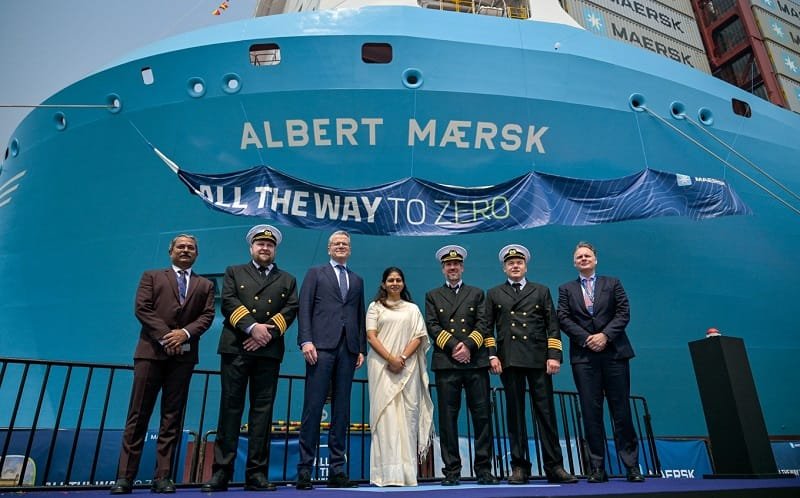A.P. Moller – Maersk (Maersk) has marked a new milestone in its decarbonization strategy by naming its 11th dual-fuel methanol container vessel, Albert Maersk, during a ceremony held in Mumbai, India. The event, which took place as part of the vessel’s maiden voyage to India, underscores Maersk’s ongoing commitment to alternative fuel adoption in the shipping industry.
Table of Contents
Advancing Methanol-Powered Shipping
The Albert Maersk is part of Maersk’s expanding fleet of dual-fuel vessels capable of running on methanol, a key component of the company’s strategy to reduce greenhouse gas (GHG) emissions. The vessel, built at Hyundai Heavy Industries in Ulsan, South Korea, boasts a capacity of 16,592 TEU and is among 18 large methanol-powered vessels scheduled for delivery between 2024 and 2025. These vessels play a crucial role in Maersk’s broader goal of achieving net-zero GHG emissions by 2040.
Methanol, including bio- and e-methanol, can reduce GHG emissions by at least 65% compared to conventional marine fuels such as fuel oil. This shift towards low-carbon alternatives aligns with Maersk’s advocacy for stronger International Maritime Organization (IMO) regulations to support a multi-fuel future in shipping, ensuring the competitiveness of alternative fuels by closing the price gap with fossil-based options.
A Historic Naming Ceremony in India
The naming ceremony was hosted by Vincent Clerc, CEO of A.P. Moller – Maersk, and attended by dignitaries, including India’s Minister of Ports, Shipping and Waterways, Sarbananda Sonowal, and Minister of State for Youth Affairs and Sports, Raksha Khadse. The event marks the first time a foreign shipping company has hosted a vessel naming ceremony in India, emphasizing the country’s growing role in green shipping initiatives.
“Maersk continues to take firm steps towards decarbonising shipping with the addition of one more dual-fuel vessel to its fleet. India is among the world’s fastest-growing major economies, with a thriving manufacturing sector, a booming e-commerce industry, and expanding exports. Shipping and logistics are high on India’s priorities, and Maersk looks forward to partnering with India on various aspects, such as exploring the potential sourcing of alternative fuels for low-emissions shipping and activities involving ship repairs and shipbuilding in the future that align well with the Indian Government’s ambitions to promote the shipping sector.” Said Vincent Clerc, CEO of A.P. Moller – Maersk
Honourable Minister of Ports, Shipping and Waterways, Sarbananda Sonowal highlighted India’s potential as a major producer and supplier of green methanol, ammonia, and hydrogen-based fuels, noting that Maersk’s investments in green fuel production in India could accelerate the country’s maritime sustainability efforts.
Maersk’s Expanding Footprint in India
India’s fast-growing economy, expanding exports, and robust manufacturing sector make it a key market for Maersk. The company currently facilitates one in every six containers imported or exported from India, supported by its integrated logistics solutions. Maersk’s operations in India include:
- Two APM Terminals in Mumbai and Pipavav, handling over three million containers annually.
- A network of 26 warehouses spanning 350,000 square meters.
- A distribution network reaching over 80% of India’s pin codes.
Additionally, Maersk announced an investment opportunity pipeline of approximately $5 billion in India’s ports, terminals, and landside infrastructure.
Keith Svendsen, CEO of APM Terminals, emphasized the company’s commitment to reducing logistics costs while enhancing efficiency through low-emission ports. He stated that APM Terminals is prepared to invest further in developing environmentally sustainable port operations that support India’s integration into global trade.
Future Outlook on Green Shipping and Alternative Fuels
Maersk’s expansion of its dual-fuel fleet signals its long-term commitment to reducing emissions and fostering the adoption of alternative fuels across the shipping sector. As the maritime industry continues to explore viable decarbonization pathways, Maersk’s investment in methanol-fueled vessels reinforces its leadership in sustainable shipping.
With growing global interest in green fuels, India’s position as a potential supplier of alternative maritime fuels, including methanol and ammonia, presents opportunities for further collaboration. As part of its broader sustainability strategy, Maersk will continue to explore partnerships in India related to shipbuilding, ship repairs, and green fuel sourcing.
The Albert Maersk is the latest step in Maersk’s transition towards low-emission shipping, underscoring the company’s ongoing efforts to reshape the industry while contributing to global climate goals.
About APM Terminals
APM Terminals, a division of A.P. Moller – Maersk, is a leading global port operator specializing in the development, operation, and management of advanced container terminals. With a presence in 60 strategic locations across 33 countries, APM Terminals plays a crucial role in facilitating global trade by providing efficient and sustainable port infrastructure. Handling over 23 million container moves annually, the company is committed to reducing emissions, improving port efficiency, and investing in innovative solutions to meet the evolving needs of the shipping and logistics industry. APM Terminals supports global supply chains by enhancing connectivity and enabling seamless cargo movement worldwide.
About Maersk
A.P. Moller – Maersk is a global leader in integrated logistics, committed to connecting and simplifying its customers’ supply chains. With operations in over 130 countries and a workforce of around 100,000 employees, Maersk is at the forefront of shipping, terminal operations, and logistics solutions. The company is driving the transition to sustainable shipping, aiming to achieve net-zero greenhouse gas (GHG) emissions by 2040 through investments in alternative fuels, energy-efficient vessels, and digital innovation. Maersk is dedicated to shaping the future of global trade with end-to-end supply chain solutions that enhance efficiency, reduce costs, and promote environmental sustainability.
Source A.P. Moller – Maersk

